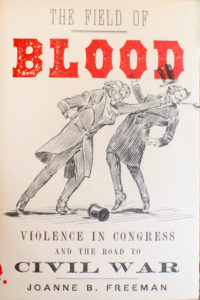Lecture Date: February 20, 2020
The Hirschler Lecture

Professor Freeman’s lecture is based on her acclaimed 2018 work, Field of Blood, which recovers the long-lost story of physical violence on the floor of the U.S. Congress. Drawing on an extraordinary range of sources, she shows that the Capitol was rife with conflict in the decades before the Civil War. Legislative sessions were often punctuated by mortal threats, canings, flipped desks, and all-out slugfests. When debate broke down, congressmen drew pistols and waved Bowie knives. One representative even killed another in a duel. Many were beaten and bullied in an attempt to intimidate them into compliance, particularly on the issue of slavery.
These fights didn’t happen in a vacuum. Freeman’s dramatic accounts of brawls and thrashings tell a larger story of how fisticuffs and journalism, and the powerful emotions they elicited, raised tensions between North and South and led toward war. In the process, she brings the antebellum Congress to life, revealing its rough realities―the feel, sense, and sound of it―as well as its nation-shaping import. Funny, tragic, and rivetingly told, The Field of Blood offers a front-row view of congressional mayhem and sheds new light on the careers of John Quincy Adams, Henry Clay, and other luminaries, as well as introducing a host of lesser-known but no less fascinating men. The result is a fresh understanding of the workings of American democracy and the bonds of Union on the eve of their greatest peril.
Speaker: Joanne Freeman

Joanne B. Freeman, Professor of History, specializes in the politics and political culture of the revolutionary and early national periods of American History. She earned her Ph.D. at the University of Virginia. Her most recent book, Affairs of Honor: National Politics in the New Republic(Yale University Press), won the Best Book award from the Society of Historians of the Early American Republic, and her edited volume, Alexander Hamilton: Writings(Library of America) was one of the Atlantic Monthly’s “best books” of 2001. Her current project, The Field of Blood: Congressional Violence in Antebellum America, explores physical violence in the U.S. Congress between 1830 and the Civil War, and what it suggests about the institution of Congress, the nature of American sectionalism, the challenges of a young nation’s developing democracy, and the longstanding roots of the Civil War.
A fellow of the Society of American Historians, Freeman has won fellowships from, among others, the American Council of Learned Societies, the Cullman Center for Scholars and Writers, the Dirkson Congressional Research Center, the American Historical Association, and the Library of Congress. She is a Distinguished Lecturer for the Organization of American Historians, and was rated one of the nation’s “Top Young Historians” in 2005.
Freeman’s articles have appeared in a wide range of academic journals including William and Mary Quarterly, Journal of the Early Republic, Journal of Policy History, and Yale Law Journal, among others. She has written op-ed pieces for the New York Times, and appeared in a host of documentaries on PBS and the History Channel, and in a number of radio programs for NPR and the BBC. She has done extensive work in the realm of public history, including co-curating museum exhibitions, acting as a historical consultant for documentary filmmakers, and giving frequent public lectures at venues such as the Smithsonian Museum of American History, the National Gallery of Art, and Colonial Williamsburg, among other places. She has also worked extensively with high school history teachers and students in workshops, lectures, and symposia around the nation. In the last two years, she has worked as a historical consultant for the National Park Service in the reconstruction of the Alexander Hamilton Grange National Memorial.